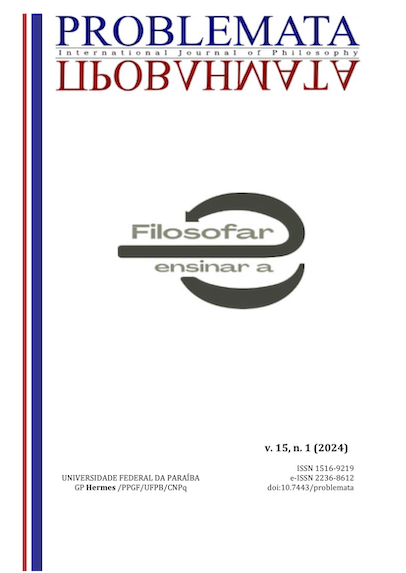PHILOSOPHING THE TEACHING OF PHILOSOPHY:
REFLECTIONS FROM NON-EUROCENTRIC PERSPECTIVES FOR THE FORMATION OF AN ANTI-RACIST EDUCATION IN BRAZIL
DOI:
https://doi.org/10.7443/problemata.v15i1.70225Keywords:
Teaching Philosophy, Decoloniality, Decolonial pedagogy, Teacher training, Professional identityAbstract
Traditionally, Philosophy teaching activities in high school are based on Eurocentric philosophers and philosophies that are exhaustively covered in undergraduate courses. The reality of Brazilian students, in its most diverse plurality, is often far from the problems raised by the academic canon. We believe, in the meantime, that reflections based on the student's reality are a first step in bringing the student closer to philosophy and also developing a critical view of their reality. To this end, we propose that non-Eurocentric philosophical traditions are also contemplated so that this distant reality from the old world can be glimpsed, in the light of other prisms. From the decolonial epistemic turn, mainly in relation to philosophy teaching that is not based on crystallized theories that reaffirm the colonial character of philosophical education, we thought about bringing other perspectives that can dialogue directly with the cultural, social, economic, ethical context, aesthetic and political aspects of these students. The identification of these philosophies as a product of critical thinking that can also be developed by them, allows knowledge and citizen autonomy to develop more easily. In this sense, we argue that this process can generate conditions for anti-racist education inside and outside of school, since the racialization of the plurality of groups that coexist and interact in our societies can be mitigated, perhaps neutralized, with the awareness and problematization of non-racism. hierarchization of cultures, an idea introjected by the coloniality present in the territorial and human exploration by modern European societies. Finally, we propose certain philosophers and philosophies that can assist in the process of a philosophy of liberation, not only for basic education students, but also for the training of teachers at university level in their degrees.
Downloads
References
BAHIA, Bruno. O Filosofar Como Meio Para Decolonizar a Filosofia. In SANCHEZ, Liliane; SILVA, Wanderley (Org.). Filosofia presente: ensaios para novas transformações. Jundiaí/SP: Paco Editorial, 2021.
BRASIL. Base Nacional Comum Curricular. 4ª versão. Brasília: MEC/SEB, 2017a.
BRASIL. Lei de Diretrizes e Bases da Educação Nacional nº 9.394/1996. Brasília: Ministério da Educação, 1996.
BRASIL. Lei nº 13.415, de 16 de fevereiro de 2017. Brasília: DOU, 2017b.
CASTRO GÓMEZ, S.; GROSFOGUEL, R. (Org.). El giro decolonial: reflexiones para uma diversidad epistemica más allá del capitalismo global. Bogotá: Siglo del Hombre Editores, 2007.
DUSSEL, Enrique. El encubrimiento del otro. Hacia El origen del “mito de la Modernidad”. La Paz: Plural editores - Faculdade de Humanidades y Ciencias de La Educación – UMSA, 1994.
DUSSEL, Enrique. Filosofia da Libertação na América Latina. São Paulo: Loyola, 1977.
GRAMSCI, Antonio. Cadernos do Cárcere (vol. 1). Rio de Janeiro: Civilização Brasileira, 1999.
HERNANDES, Paulo R. A reforma do Ensino Médio e a produção de desigualdades na educação escolar. Educação, 44. e-58/1-19, Santa Maria, 2019.
JEAGER, Werner. Paideia. São Paulo: Martins Fontes, 1996.
LANDER, Edgardo (Org.). A Colonialidade do Saber: Eurocentrismo e Ciências Sociais perspectivas latino-americanas. Buenos Aires: CLACSO, 2005.
LÉVY, Pierre. Cibercultura. São Paulo: Editora 34, 1999.
ORTEGA Y GASSET, José. Missão da universidade. Rio de Janeiro: EdUERJ, 1999.
SANTOS, Boaventura de Souza; MENESES, Maria Paula. Epistemologias do Sul. São Paulo: Cortez, 2010.
SAVIANI, Demerval. Educação: do senso comum à consciência filosófica. Campinas: Autores Associados, 1980.
SERRES, Michel. Polegarzinha: uma forma de viver em harmonia de pensar as instituições, de ser e de saber. Rio de Janeiro: Bertrand Brasil, 2013.
WALSH, Catherine. Pedagogías Decoloniales: Prácticas insurgentes de resistir, (re)existir, y (re)vivir. Quito, Ecuador: Ediciones Abya-Yala, 2013.
Downloads
Published
Issue
Section
License
Copyright (c) 2024 Bruno Bahia

This work is licensed under a Creative Commons Attribution 4.0 International License.
Authors who publish with this journal agree to the following terms:
- Authors retain copyright and grant the journal right of first publication with the work simultaneously licensed under a Creative Commons Attribution License that allows others to share the work with an acknowledgement of the work's authorship and initial publication in this journal.
- Authors are able to enter into separate, additional contractual arrangements for the non-exclusive distribution of the journal's published version of the work (e.g., post it to an institutional repository or publish it in a book), with an acknowledgement of its initial publication in this journal.
-
- Authors are permitted and encouraged to post their work online (e.g., in institutional repositories or on their website) prior to and during the submission process, as it can lead to productive exchanges, as well as earlier and greater citation of published work (See The Effect of Open Access).





